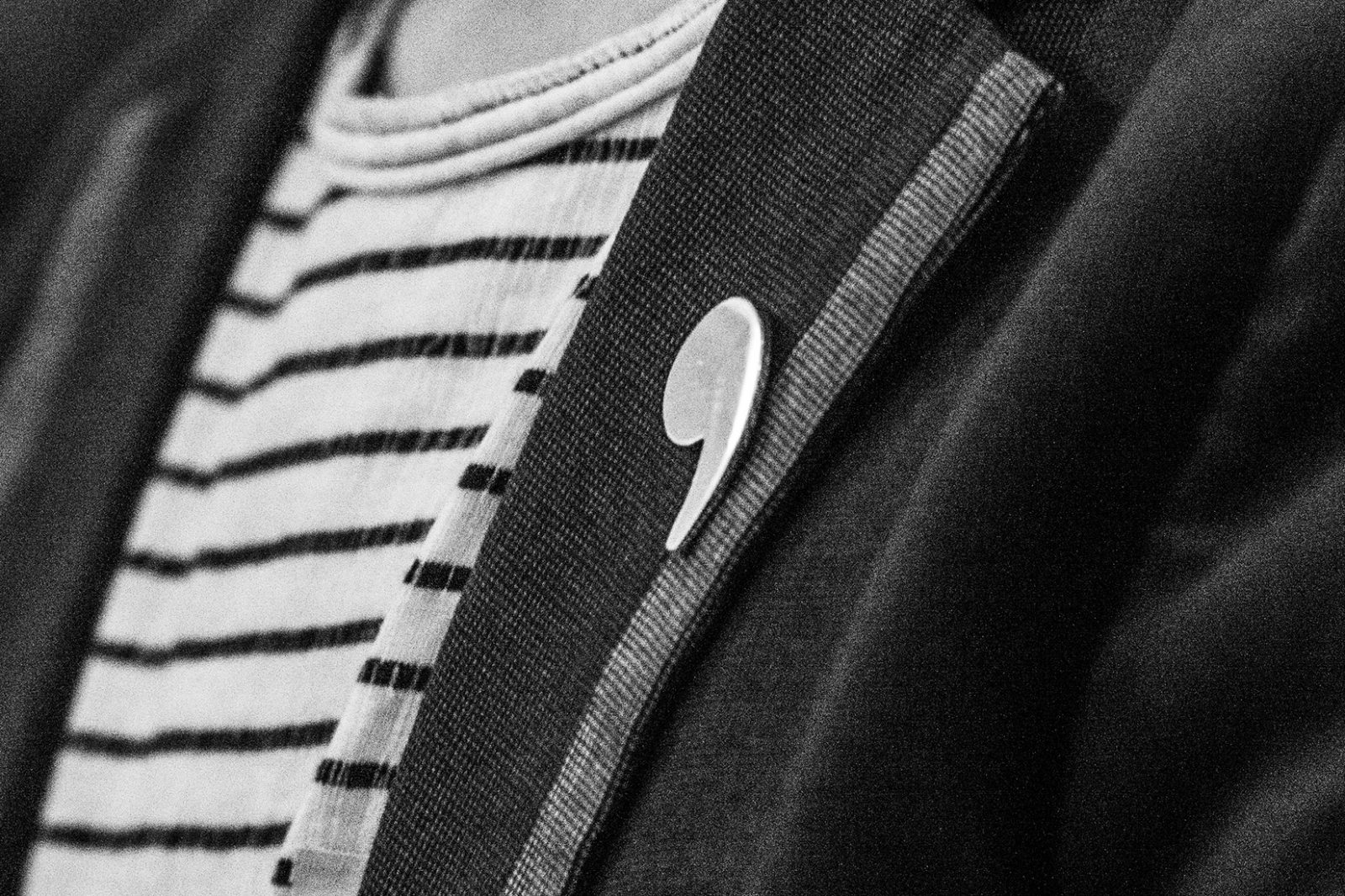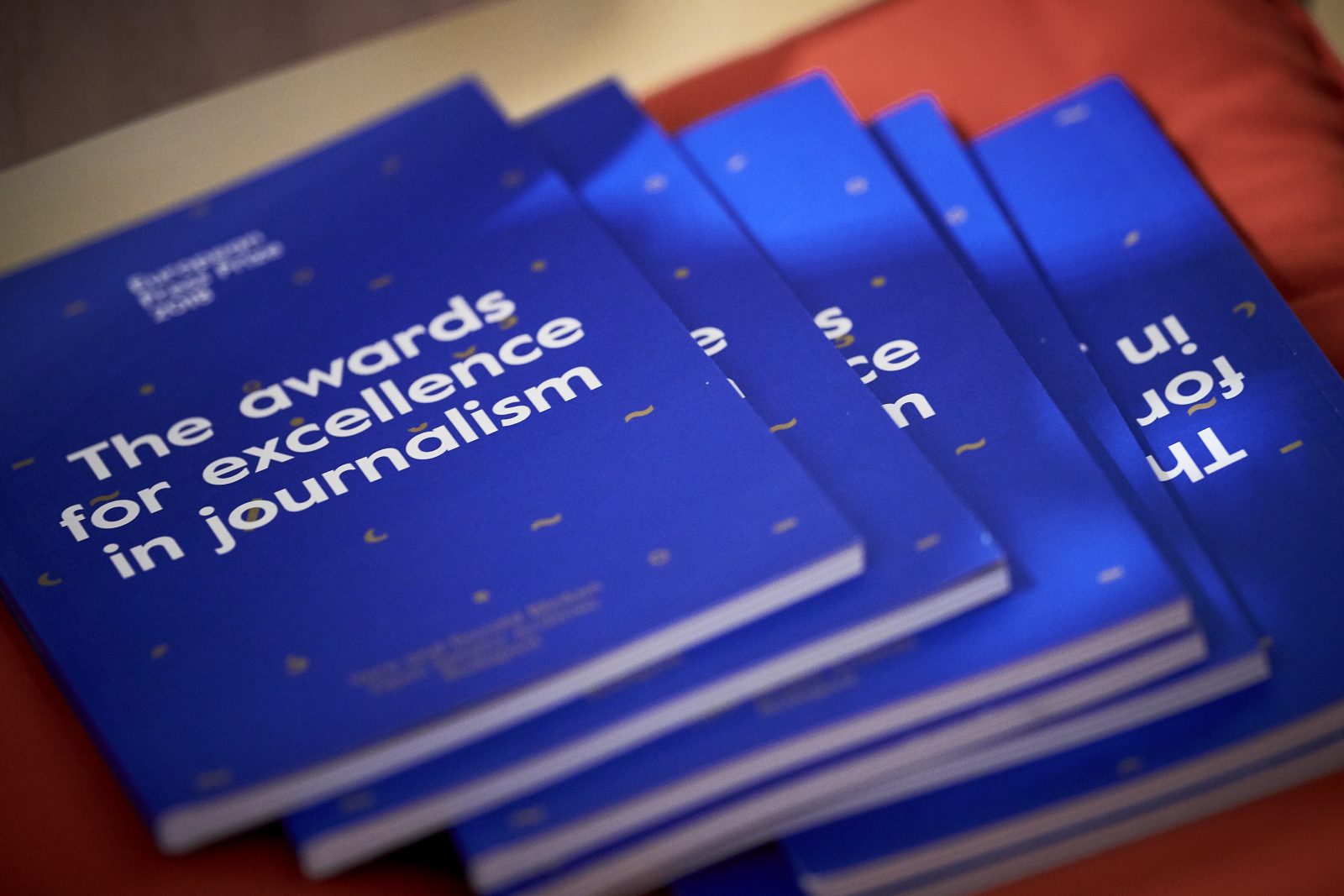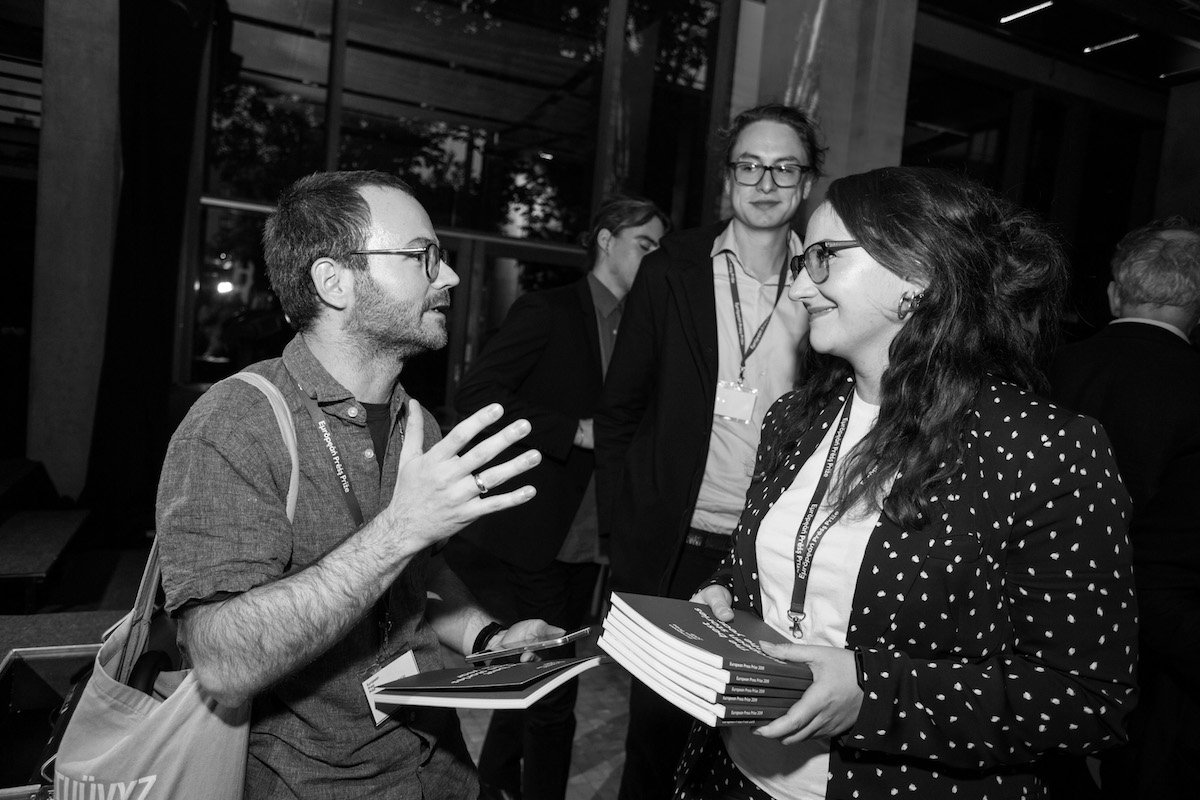Laureate Interview: Ioannis Papadopoulos and Andreea Giuclea
The entry period for the 2021 edition of the European Press Prize will be open until December 11, 2020. During this entry period, the European Press Prize interviewed some laureates from the past years. Our two-time laureate Andreea Giuclea from Romania and our 2016 laureate Ioannis Papadopoulos from Greece talked to us about the impact of this year’s events on their work and shared their perspective on quality journalism.
 Ioannis Papadopoulos is a print reporter and multimedia producer based in Athens, Greece. He works as a feature writer and an investigative reporter at Greek newspaper Kathimerini focusing on social issues and immigration. Andreea Giuclea is a Romanian sports reporter passionate about the inner lives of athletes and the systems they perform in. She covers this topic for Lead.ro, a daily sports website, and writes in-depth stories for the narrative magazine DoR (Decât o Revistă).
Ioannis Papadopoulos is a print reporter and multimedia producer based in Athens, Greece. He works as a feature writer and an investigative reporter at Greek newspaper Kathimerini focusing on social issues and immigration. Andreea Giuclea is a Romanian sports reporter passionate about the inner lives of athletes and the systems they perform in. She covers this topic for Lead.ro, a daily sports website, and writes in-depth stories for the narrative magazine DoR (Decât o Revistă).
What (journalistic) event in 2020 has made a big impression on you?
Ioannis: The new coronavirus pandemic has been -and still is- the event of the year. It has been called an “invisible threat,” an “insidious virus.” It has driven medical personnel to exhaustion in so many countries. It has changed our lifestyle and impacted our economies. Since March, it has been the top story for Greece – and it still is.
However, in early October there was another story that put Greece in the spotlight. A court in Athens found the Greek neo-Nazi party Golden Dawn guilty of running a criminal organization. For years, Golden Dawn members targeted immigrants and critics. Their violent attacks culminated to the murder of anti-fascist rapper Pavlos Fyssas in 2013. Their trial lasted over five years leading to a landmark verdict.
Andreea: To me, as a sports reporter, the most meaningful event was the #GymnastAlliance movement, in which gymnasts around the world spoke about and contested the verbal, emotional and physical abuse they suffered from their coaches, in the pursuit of Olympic glory. It started this summer, after the release of the Athlete A documentary, which highlights the sexual abuse scandal involving the US Olympic doctor Larry Nassar, and how the toxic culture of gymnastics allowed for this kind of abuse to happen. In the months that followed, gymnasts talked in interviews and in posts on their social networks, together with the #GymnastAlliance tag, about their own experiences and the culture of body-shaming, training on injuries, insults, fear, intimidation, and sometimes physical punishment that has defined gymnastics during the past decades.
“It was inspiring to watch athletes come together like this and ask for change.”
Similar to the #MeToo movement, each story inspired other gymnasts to speak up and together they asked for a change from those leading the sport. Some national governing bodies started internal investigations, others fired coaches or those in charge of the sport, and a lot of discussions about what measures could be taken for a safer sport followed. It was inspiring to watch athletes come together like this and ask for change, and it was an important story to report on.
How has 2020 impacted you and the work you do as a journalist?
Ioannis: This has been a difficult year. The new coronavirus pandemic has set new rules for all of us. Social distancing and teleworking became the new norm. As a reporter, I often try to meet my sources in person. But in some cases this has been impossible due to the pandemic. Some of them fell sick and it wasn’t possible to enter their homes. Others had underlying illnesses and were too afraid to arrange any meeting that might expose them to the virus. It’s not the same to interview someone on the phone or via Skype. It could be harder to break the ice, gain their trust, observe their reactions.
“I had to dig deeper, find new angles, search for new narratives, do more follow-ups on stories I wrote.”
During the first and second wave of the virus I have been visiting COVID-19 clinics in Greece and this has also been a stressful experience. There are certain steps that a reporter has to follow in those places in order to decrease any risk of contamination. But just the thought that I could contact the virus and carry it home to my family made me anxious.
Since the pandemic has monopolized my reporting this year at some point I experienced COVID-fatigue. I felt like there was nothing new to say, nothing newsworthy to write about anymore. I had to dig deeper, find new angles, search for new narratives, do more follow-ups on stories I wrote. This process is still ongoing.
Andreea: As a sports reporter, at the beginning of the year I was looking at a calendar packed with competitions and events I wanted to cover – the Olympic Games, Euro 2020, and several others – and suddenly they all disappeared, were either postponed or canceled. So I had to adapt my plans, to find new ways of looking at sports in this greater context, to improve my phone-interviewing skills, to replace being in the field. It also prompted some financial challenges, as some projects were put on hold, others stalled. But it also gave me time to work on an important story I’ve been wanting to do for a while and never found the time, so I’m grateful for that.

In light of all this, what do you feel is the role of quality journalism, now and in the future?
Ioannis: In times like this the role of quality journalism is more essential than ever. During the last few months, in many countries, anti-mask groups and anti-vaxxers have emerged online spreading misinformation and conspiracy theories, organising rallies and protests, calling COVID-19 just “a harmless flu,” or even denying its existence. Despite their irrational arguments they have been able to assemble an audience, in Greece and elsewhere. Ignoring them could be one journalistic approach. However, their rumours and fake news will keep on spreading online possibly gaining more sympathizers.
“Decades from now, future generations will look back to journalistic stories which were written during the new coronavirus pandemic, learn what went wrong and why.”
I believe that journalists are obliged to expose those lies, debunk those theories, help their readers understand how dangerous this virus can be and how they should protect themselves and the people around them. Decades from now, future generations will look back to journalistic stories which were written during the new coronavirus pandemic, learn what went wrong and why. Those stories can be our legacy to them, a warning sign that will help them avoid repeating the same mistakes.
Andreea: I think this year showed us even more how essential good journalism is; how important it is to have reliable sources of information, clarity, and context when the avalanche of events and emotions can become overwhelming. From the pandemic to the US elections, to the Black Lives Matter movement, there were so many important events this year, and we wouldn’t have the tools to understand, grasp and filter all of it without journalism, without well-researched stories that put everything in context, that help us make sense of it all, and that explain how it all affects our day to day lives, but also stories that provide a bit of relief and hope, so necessary in times like these.
“We wouldn’t have the tools to understand, grasp and filter all important events this year without journalism.”

Funds You May Be Eligible For as an European Journalist this Fall

European Press Prize Ceremony 2019. Photo: Adam Stepien/Agencja Gazeta
In the business of awarding quality journalism, funding it goes hand in hand. Here is a list of resources granting European journalists financial support this Fall.
Journalismfund.eu
Journalismfund.eu facilitates independent cross-border investigative journalism in Europe by connecting donors and journalists. The website provides a list of European grants for several different segments of media as well as supported projects and events for journalists. On their homepage you can find all grants still receiving applications in 2020 and their upcoming deadlines.
European Journalism Centre
The European Journalism Centre connects journalists while supporting their careers, newsrooms and industry. In partnership with the Bill & Melinda Gates Foundation, their Innovation in Development Reporting Grant Programme (IDR) has funded over 140 projects across Europe. All their grants can be found here.
Nieman-Berkman Klein Fellowship in Journalism Innovation
The Nieman-Berkman Klein Fellowship in Journalism Innovation takes individuals to Harvard University to work on a specific course of research or a specific project relating to journalism innovation. “Proposals from Nieman-Berkman Klein Fellowship candidates may deal with any issue relating to journalism’s digital transformation.” The deadline for international journalists (outside the U.S.) is Dec. 1.
Caruana Galizia Prize for Journalism
Journalist and anti-corruption activist Daphne Caruana Galizia was assassinated on Oct. 16, 2017. “To commemorate the third anniversary of the assassination of the Maltese investigative journalist, the prize will reward journalism reflecting EU principles and values.” The European Parliament has recently launched this grant in remembrance of Caruana Galizia’s work. The criteria for the prize are yet to be decided, but more information can be found here.
Last but not least, the European Press Prize
Entries for the European Press Prize opened on Oct.1 and will close on Dec. 11. Stories up to 5,000 words and published in any language across the 47 European countries are eligible. A short description in English is required. Journalists can submit their work here.

